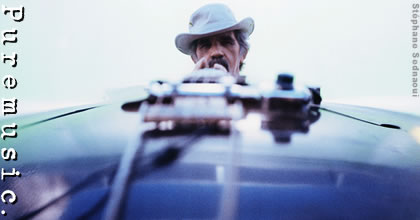
A Conversation with J.J. Cale (continued)
PM: So you often multitrack your vocals, like in unison or octaves, right through your career.
JJC: I did that because I can't sing.
PM: [laughs]
JJC: I mean, I'm a songwriter, and what I really should have done early in my career is hire me somebody that could really sing and said, "Now go out here and sing this." That also hinders my songwriting because I can only hit about two notes. If I want to write some kind of melody of a song that everybody would like, I can't perform the damn thing. So I have to write it in this two-note thing, and that's why my records kind of all sound that way.
PM: [laughs] Some of us like that sound, by the way.
JJC: Yeah? Well, it works, but it also has its limitations. It keeps me from writing songs that I'd write if I had a good singer to sing it.
PM: Wow.
JJC: And another reason, I know when Audie was here and we used to do that, yeah, I'd multitrack my voice to take the intonation out of it--bad intonation out of it. Now they have pitch correctors, right? And you can just run it through there and make yourself sound great.
PM: It's awful.
JJC: In those days they didn't, so I'd maybe put my voice on two, three times, and we'd just mix it up there and go, "Well, it sounds kind of like a shitty choir."
PM: [laughs]
JJC: And it worked.
PM: But it's still there on To Tulsa and Back, right, there's still some gang vocals?
JJC: Every once in a while. Well, I still can't sing.
PM: [laughs] That hasn't changed.
JJC: After forty, fifty years of making records, I didn't learn how to sing. I still write the songs. So, yeah, I do it. I do it. Two or three songs, I multitracked my voice on there or multitracked the guitar. So I mean, I do use the technology if I think it benefits the recording.
PM: Yeah, I love that sound. And I want to try doing some more of that. Now, you take separate passes, right, and then just mix them all together?
JJC: Right.
PM: And do you tend to pan them different ways? [Panning is where you place a sound somewhere in the stereo field, like on the light or extreme left, or down the middle, etc.]
JJC: That all depends. I mean, one song will sound good with everything just mono, and another one it sounds better if you kind of split them up and it gives you another--you're starting to get into stereo there, right? And I'll do that, or I have delved into 5.1. [Surround Sound, the wave of the audiophile present and consumer future.] That's amazing what you can do with that.
PM: No kidding.
JJC: But I don't think most of the folks are into 5.1 yet either. I think that's coming, but I don't think the regular guy owns 5.1. So anyway, yeah, sometimes I'll put it all in the same spot in the audial spectrum. I'll listen to both, and that's that mixing process. Then you go, "Well, it sounds better this way, and it sounds worse that way." And it's kind of a creative process of mixing.
PM: But you'll generally keep the same chain going if you're ganging vocals, right? [Adding more vocals tracks singing the same or similar thing.] You'll keep the same mic and stuff?
JJC: Well, yeah, for expediency. If I rent a studio and hire an engineer, or I'm at, say, Capitol in L.A. or a fancy studio or whatever, Oceanway, or if I'm in--I haven't recorded in Nashville now in fifteen years, but in those days when we rented the old Columbia Studios and The Barn, and all the finer studios there in Nashville--they probably don't exist anymore--
PM: Half of them, right.
JJC: --and there was an engineer, and I didn't have to do the engineering stuff, I could just be an artist and nothing else, we would change it around and try to see what kind of a sound we could get. But I'd generally leave it up to the engineer. About half of all the songs on all my records, I mixed, even going back to the first album, and about have of them somebody else mixed them. And sometimes they'd mix them and I'd go, "I don't like his mix," and I'd go mix it myself. And then other times I wouldn't like my mix and I'd get somebody else to mix it. continue
print (pdf) listen to clips puremusic home